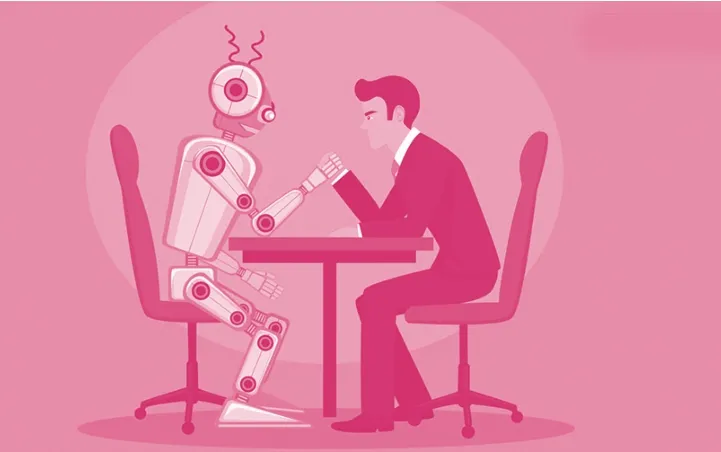Translation platforms Cannot Replace Humans
译/范梦栩 审订/马士奎
But they are still astonishingly useful.
但它们依然极其有用。
Arab newspapers have a reputation,partly deserved, for tamely1tamely乖乖地,驯服地。taking the of fi cial line. On any given day, for example, you might read that “a source close to the Iranian Foreign Ministry toldAl-Hayatthat ‘Tehran will continue to abide by the terms of the nuclear agreement as long as the other side does the same.’” But the exceptional thing about this unexceptional story is that,thanks to Google, English-speaking readers can now read this in the Arab papers themselves.
[2] In the past few months free online translators have suddenly got much better. This may come as a surprise to those who have tried to make use of them in the past. But in November Google unveiled a new version of Translate. The old version, called “phrase-based” ma-
阿拉伯报纸以为官方代言著称,从某种程度上说,此言不虚。比如说,随便在哪天的报纸上,都可能就会读到类似的话:“一位同伊朗外交部关系密切的人士告诉《生活日报》,‘只要对方遵守核协议,德黑兰也会遵守。’”这本不是什么新鲜事儿,然而其背后非同寻常之处在于,借助谷歌翻译,英语国家的读者如今可以直接阅读这则阿拉伯语新闻了。
[2]最近数月,免费在线翻译平台突然大有改观。与以往用户体验相比,简直能用惊喜来形容。11月,谷歌公司推出了新版谷歌翻译。其旧版为基于词组的机器翻译,即把chine translation, worked on hunks of a sentence separately, with an output that was usually choppy and often inaccurate.
[3] The new system uses an artificial neural network, linking digital“neurons” in several layers, each one feeding its output to the next layer, in an approach that is loosely modelled on the human brain. Neural-translation systems, like the phrase-based systems before them, are fi rst “trained” by huge volumes of text translated by humans.But the neural version takes each word,and uses the surrounding context to turn it into a kind of abstract digital representation. It then tries to fi nd the closest matching representation in the target language, based on what it has learned before. Neural translation handles long sentences much better than previous versions did.
[4] The new Google Translate began by translating eight languages to and from English, most of them European.It is much easier for machines (and humans) to translate between closely related languages. But Google has also extended its neural engine to languages like Chinese (included in the fi rst batch)and, more recently, to Arabic, Hebrew,Russian and Vietnamese, an exciting leap forward for these la. Microsoft also has a neural system for several hard languages.
[5] Google Translate does still oc-句子拆分成语块然后逐个翻译,译文常常支离破碎,而且不够准确。
[3]新版的翻译原理是利用人工神经网络系统,将数个层次之间的数字“神经元”连接起来,每个神经元直接将结果输送到下一层次。这就类似人脑的运作方式。与旧版基于词组的翻译系统一样,这种神经网络翻译系统也要接受大量人工翻译文本的“训练”。但后者以词为单位处理文本,还会根据语境将词汇转换为一种抽象的数字化表述,然后根据之前的学习,从目标语中找出与原词最接近的表达。神经网络翻译系统处理长句的能力比之前几个版本都高出不少。
[4]新版谷歌翻译始于英语同其他8种语言之间的互译,以欧洲语言为主。无论对机器还是对人类来说,在关系密切的语言之间进行翻译总要容易许多。当然,这种神经网络翻译系统已经涵盖其他一些语言,比如中文(首批8种语言之一),近期又扩展到阿拉伯语、希伯来语、俄语和越南语。微软公司同样开发了一种可以处理几种复杂语言的翻译系统。
[5]谷歌翻译在处理句子casionally garble sentences. The introduction to aHaaretzstory in Hebrew had text that Google translated as: “According to the results of the truth in the first round of the presidential elections,Macaron and Le Pen went to the second round on May 7. In third place are Francois Peyon of the Right and Jean-Luc of Lanschon on the far left.” If you don’t know what this is about, it is nigh on2nigh on几乎;差不多。useless. But if you know that it is about the French election, you can see that the engine has badly translated“samples of the official results” as “results of the truth”. It has also given odd transliterations for (Emmanuel) Macron and (François) Fillon (P and F can be the same letter in Hebrew). And it has done something particularly funny with Jean-Luc Mélenchon’s surname. “Me-” can mean “of” in Hebrew. The system is“dumb”, having no way of knowing that Mr Mélenchon is a French politician. It has merely been trained on lots of text previously translated from Hebrew to English.
[6] Such fairly predictable errors should gradually be winnowed3winnow甄别;筛去。out as the programmers improve the system.But some “mistakes” from neuraltranslation systems can seem mysterious.Users have found that typing in random characters in languages such as Thai, for example, results in Google producing时偶尔也会断章取义。以色列《国土报》曾刊登过一则希伯来语的新闻导语,谷歌翻译结果如下:According to the results of the truth in the first round of the presidential elections, Macaron and Le Pen went to the second round on May 7. In third place are Francois Peyon of the Right and Jean-Luc of Lanschon on the far left. 如果你对相关背景一无所知,这段译文基本没有意义。但是倘若你知道文章涉及法国大选,就会发现译文拙劣之处,竟然将samples of the official results(抽检的官方数据)译为results of the truth(事实的结果)。此外,人名Emmanuel (Macron)和 (François) Fillon(在希伯来语中P和F可能是同一个字母)也音译得很古怪。尤为可笑的是,谷歌还把让-吕克·梅朗雄的姓氏搞错了。Me-在希伯来语中的意思为of(属于……的)。翻译系统很“呆”,无法了解到梅朗雄先生其实是一位法国政客,它只是接受过先前大量英译希伯来语文本的训练。
[6]程序员将会不断完善翻译系统,这种可以预见的错误想必会随之逐步得到修正。oddly surreal “translations” like: “There are six sparks in the sky, each with six spheres. The sphere of the sphere is the sphere of the sphere.”
[7] Although this might put a few postmodern poets out of work, neuraltranslation systems aren’t ready to replace humans any time soon. Literature requires far too supple4supple(思想等)反应灵活的。an understanding of the author’s intentions and culture for machines to do the job. And for critical work—technical, financial or legal,say—small mistakes (of which even the best systems still produce plenty) are unacceptable; a human will at the very least have to be at the wheel55 be at the wheel掌舵;控制。to vet and edit the output of automatic systems.
[8] Online translating is of great benefit to the globally curious. Many people long to see what other cultures are reading and talking about, but have no time to learn the languages. Though still finding its feet, the new generation of translation software dangles the promise of being able to do just that. ■但是神经网络翻译系统的一些“错误”可能让人难以理解。某些用户发现,当你随便输入某种语言(比如泰语)的几个字词,谷歌翻译竟然会生成超现实派的“译文”,比如:There are six sparks in the sky, each with six spheres. The sphere of the sphere is the sphere of the sphere.

[7]这或许会让少数后现代主义诗人丢掉饭碗,不过短期内神经网络翻译尚无法取代人工翻译。文学翻译要求译者能够灵活把握作者意图和文化背景,机器翻译显然力不能及。在翻译科技、金融或法律等关键领域的文本时,容不得半点差池(而纵使最先进的翻译系统也有层出不穷的小差错),至少还需要人工译员把关,校对和编辑自动翻译的结果。
[8]对于对世界充满好奇心的人来说,在线翻译的确是一大福音。许多人渴望了解其他文化环境中的人在读些什么,谈些什么,但是又没有时间学习那些语言。新一代翻译软件尽管还处于起步阶段,但它或许能够帮助人们实现这一愿望。 □
- 英语世界的其它文章
- How the Tea Ceremony Works
- Major Lawrence—for Steve Ormrod
- A View from China on the Future of Innovation and Education
- Do Aliens Exist? Human Technology May Prevent Us from Finding Out
- Home Is Where the Art Is: The Unlikely Story of Folk Artist Maud Lewis
- Laughter, Tears as Former First Lady Barbara Bush1 Remembered

